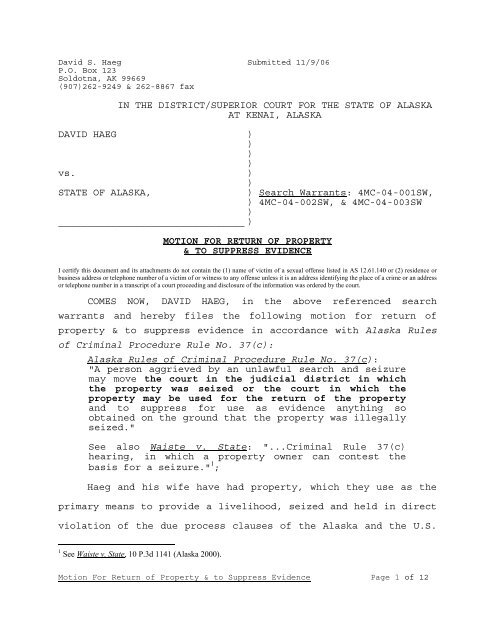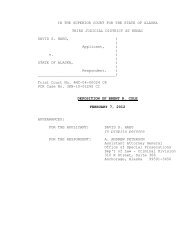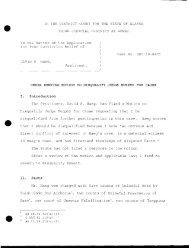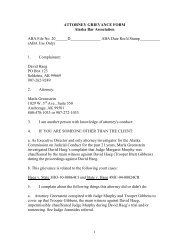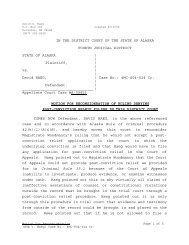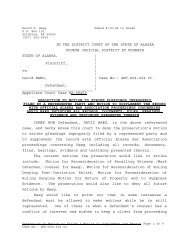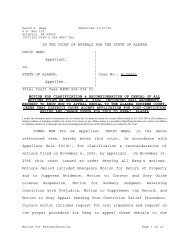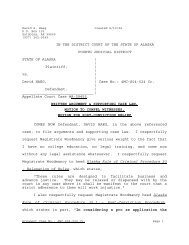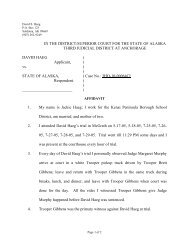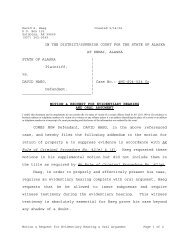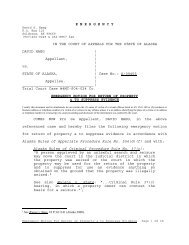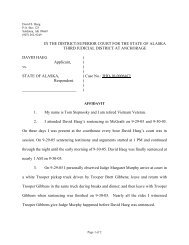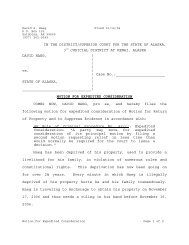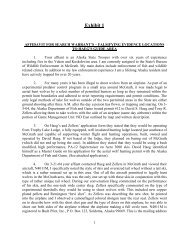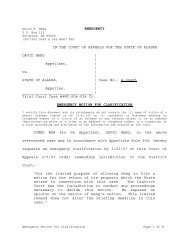Motion for Return of Property & to Suppress Evidence.
Motion for Return of Property & to Suppress Evidence.
Motion for Return of Property & to Suppress Evidence.
Create successful ePaper yourself
Turn your PDF publications into a flip-book with our unique Google optimized e-Paper software.
David S. Haeg Submitted 11/9/06<br />
P.O. Box 123<br />
Soldotna, AK 99669<br />
(907)262-9249 & 262-8867 fax<br />
IN THE DISTRICT/SUPERIOR COURT FOR THE STATE OF ALASKA<br />
AT KENAI, ALASKA<br />
DAVID HAEG )<br />
)<br />
)<br />
)<br />
vs. )<br />
)<br />
STATE OF ALASKA,<br />
) Search Warrants: 4MC-04-001SW,<br />
) 4MC-04-002SW, & 4MC-04-003SW<br />
)<br />
________________________________ )<br />
MOTION FOR RETURN OF PROPERTY<br />
& TO SUPPRESS EVIDENCE<br />
I certify this document and its attachments do not contain the (1) name <strong>of</strong> victim <strong>of</strong> a sexual <strong>of</strong>fense listed in AS 12.61.140 or (2) residence or<br />
business address or telephone number <strong>of</strong> a victim <strong>of</strong> or witness <strong>to</strong> any <strong>of</strong>fense unless it is an address identifying the place <strong>of</strong> a crime or an address<br />
or telephone number in a transcript <strong>of</strong> a court proceeding and disclosure <strong>of</strong> the in<strong>for</strong>mation was ordered by the court.<br />
COMES NOW, DAVID HAEG, in the above referenced search<br />
warrants and hereby files the following motion <strong>for</strong> return <strong>of</strong><br />
property & <strong>to</strong> suppress evidence in accordance with Alaska Rules<br />
<strong>of</strong> Criminal Procedure Rule No. 37(c):<br />
Alaska Rules <strong>of</strong> Criminal Procedure Rule No. 37(c):<br />
"A person aggrieved by an unlawful search and seizure<br />
may move the court in the judicial district in which<br />
the property was seized or the court in which the<br />
property may be used <strong>for</strong> the return <strong>of</strong> the property<br />
and <strong>to</strong> suppress <strong>for</strong> use as evidence anything so<br />
obtained on the ground that the property was illegally<br />
seized."<br />
See also Waiste v. State: "...Criminal Rule 37(c)<br />
hearing, in which a property owner can contest the<br />
basis <strong>for</strong> a seizure." 1 ;<br />
Haeg and his wife have had property, which they use as the<br />
primary means <strong>to</strong> provide a livelihood, seized and held in direct<br />
violation <strong>of</strong> the due process clauses <strong>of</strong> the Alaska and the U.S.<br />
1 See Waiste v. State, 10 P.3d 1141 (Alaska 2000).<br />
<strong>Motion</strong> For <strong>Return</strong> <strong>of</strong> <strong>Property</strong> & <strong>to</strong> <strong>Suppress</strong> <strong>Evidence</strong> Page 1 <strong>of</strong> 12
constitutions. This property was seized in March and April <strong>of</strong><br />
2004 and neither David or Jackie Haeg have ever been given their<br />
due process rights in the years since, even though the Alaska<br />
Supreme Court ruled they had <strong>to</strong> be provided "notice and an<br />
unconditioned opportunity <strong>to</strong> contest the state's reasons <strong>for</strong><br />
seizing the property ... within days, if not hours " 2 . David and<br />
Jackie Haeg need a decision in hand by November 16, 2006 or a<br />
decision delivered <strong>to</strong> the <strong>Evidence</strong> Cus<strong>to</strong>dian <strong>of</strong> the Alaska State<br />
Troopers at 5700 E. Tudor Road, Anchorage, AK 99507-1225, phone<br />
number (907)269-5761 by 1:00 p.m. November 17, 2006. On November<br />
17, 2006 David and Jackie Haeg will be driving from their home in<br />
Soldotna <strong>to</strong> Anchorage <strong>to</strong> effect possession <strong>of</strong> their property,<br />
which has been seized and held in clear violation <strong>of</strong> law, rule,<br />
and constitution.<br />
Every day that David and Jackie Haeg are<br />
illegally deprived <strong>of</strong> this property causes them irreparable harm<br />
by directly affecting their ability <strong>to</strong> provide a livelihood <strong>for</strong><br />
their two daughters.<br />
Haeg has filed motions previously that have not been ruled<br />
upon. The rule and law is very clear. There does not need <strong>to</strong> be<br />
any case number, there does not need <strong>to</strong> be a criminal case, and<br />
there does not need <strong>to</strong> be a civil case, because Criminal Rule 37<br />
is entirely about af<strong>for</strong>ding someone the right <strong>to</strong> be heard when<br />
their property, especially property they use <strong>for</strong> providing <strong>for</strong><br />
their livelihood, is seized and held. Haeg is not trying <strong>to</strong><br />
2 See F/V American Eagle v. State, 10 P.3d 1141 (Alaska 1980)<br />
<strong>Motion</strong> For <strong>Return</strong> <strong>of</strong> <strong>Property</strong> & <strong>to</strong> <strong>Suppress</strong> <strong>Evidence</strong> Page 2 <strong>of</strong> 12
challenge evidence at this point. The point (by law, Rule and<br />
constitution) is that when property (even though the State may<br />
claim it is "evidence") is seized, especially when the property<br />
seized is used <strong>to</strong> provide a livelihood, an "ensemble <strong>of</strong><br />
procedural rules bounds the State's discretion...and limits the<br />
risks and duration <strong>of</strong> harmful errors" (Alaska Supreme Court). 3<br />
The Alaska Supreme Court has held this ensemble includes that<br />
"[T]he standards <strong>of</strong> due process under the Alaska and<br />
federal constitutions require that a deprivation <strong>of</strong><br />
property be accompanied by notice and opportunity <strong>for</strong><br />
hearing at a meaningful time <strong>to</strong> minimize possible<br />
injury. When the seized property is used by its owner<br />
in earning a livelihood, notice and an unconditioned<br />
opportunity <strong>to</strong> contest the state's reasons <strong>for</strong> seizing<br />
the property must follow the seizure within days, if<br />
not hours, <strong>to</strong> satisfy due process guarantees even where<br />
the government interest is urgent." 4<br />
Neither Haeg nor his wife Jackie, who both own the seized<br />
property and both used it as the primary means <strong>to</strong> earn a<br />
livelihood, were ever given any <strong>of</strong> these procedures. In not being<br />
given these procedures both Haeg and his wife were harmed<br />
immeasurably.<br />
There are no debatable issues <strong>of</strong> fact, Rule or Law.<br />
Haeg also points out a further Alaska Supreme Court holding<br />
in F/V American Eagle v. State, "As a general rule, <strong>for</strong>feitures<br />
are disfavored by law, and thus <strong>for</strong>feiture statutes should be<br />
strictly construed against the government". The State failed <strong>to</strong><br />
follow any <strong>of</strong> the "ensemble <strong>of</strong> procedural rules" specifically<br />
required. They never gave Haeg or his wife any <strong>of</strong> the<br />
3 See Waiste v. State 10 P.3d 1141 (Alaska 2000).<br />
4 See F/V American Eagle v. State, 10 P.3d 1141 (Alaska 1980).<br />
<strong>Motion</strong> For <strong>Return</strong> <strong>of</strong> <strong>Property</strong> & <strong>to</strong> <strong>Suppress</strong> <strong>Evidence</strong> Page 3 <strong>of</strong> 12
constitutional guarantees specifically mandated by both the<br />
Alaska Supreme Court and the U.S. Supreme Court.<br />
The specific written requirements in Alaska <strong>to</strong> comply with<br />
these rulings are found in the Alaska Rules <strong>of</strong> Civil Procedure –<br />
as property seizures and <strong>for</strong>feitures, although <strong>of</strong> "quasi-criminal<br />
nature" 5 , are "civil in <strong>for</strong>m". In fact there is no mention at all<br />
<strong>of</strong> the due process requirements <strong>for</strong> seizing and <strong>for</strong>feiting<br />
property in the Alaska Rules <strong>of</strong> Criminal Procedure although<br />
Alaska Statutes authorize property seizures and <strong>for</strong>feitures in<br />
Fish and Game criminal prosecutions under:<br />
AS 16.05.190: "[<strong>Property</strong>] seized under the provisions<br />
<strong>of</strong> this chapter or a regulation <strong>of</strong> the department,<br />
unless <strong>for</strong>feited by order <strong>of</strong> the court, shall be<br />
returned, after completion <strong>of</strong> the case and payment <strong>of</strong><br />
the fine, if any."<br />
AS 16.05.195: "[<strong>Property</strong>] used in or in aid <strong>of</strong> a<br />
violation <strong>of</strong> this title or AS 08.54, or regulation<br />
adopted under this title or AS 08.54, may be <strong>for</strong>feited<br />
<strong>to</strong> the state. (1) upon conviction <strong>of</strong> the <strong>of</strong>fender in a<br />
criminal proceeding <strong>of</strong> a violation <strong>of</strong> this title or AS<br />
08.54 in a court <strong>of</strong> competent jurisdiction; or (2)<br />
upon judgment <strong>of</strong> a court <strong>of</strong> competent jurisdiction in<br />
a proceeding in rem that an item specified above was<br />
used in or in aid <strong>of</strong> a violation <strong>of</strong> this title or AS<br />
08.54 or a regulation adopted under this title or AS<br />
08.54".<br />
Thus, although authorized as an additional punishment <strong>for</strong> a<br />
criminal conviction, a property seizure and <strong>for</strong>feiture<br />
[attachment], even when ancillary [secondary] <strong>to</strong> a criminal<br />
proceeding, must follow civil rules. In Alaska <strong>for</strong>feiture <strong>of</strong><br />
seized property is obtained through the remedy <strong>of</strong> attachment.<br />
This is the only method published in Alaska:<br />
5 See Graybill v. State, 545 P.2d 629 (Alaska 1976).<br />
<strong>Motion</strong> For <strong>Return</strong> <strong>of</strong> <strong>Property</strong> & <strong>to</strong> <strong>Suppress</strong> <strong>Evidence</strong> Page 4 <strong>of</strong> 12
Alaska Rules <strong>of</strong> Criminal Procedure Rule 54: Process –<br />
"Process issued in all criminal actions in the<br />
superior court shall be issued, and return thereon<br />
made, in the manner prescribed by Rule 4, Rules <strong>of</strong><br />
Civil Procedure."<br />
Alaska Rules <strong>of</strong> Civil Procedure Rule 4: "(c) Methods<br />
<strong>of</strong> Service - Appointments <strong>to</strong> Serve Process - (3)<br />
Special appointments <strong>for</strong> the service <strong>of</strong> all process<br />
relating <strong>to</strong> remedies <strong>for</strong> the seizure <strong>of</strong> persons or<br />
property pursuant <strong>to</strong> Rule 64 or <strong>for</strong> the service <strong>of</strong><br />
process <strong>to</strong> en<strong>for</strong>ce a judgment by writ <strong>of</strong> execution<br />
shall only be made by the Commissioner <strong>of</strong> Public<br />
Safety after a thorough investigation <strong>of</strong> each<br />
applicant, and such appointment may be made subject <strong>to</strong><br />
such conditions as appear proper in the discretion <strong>of</strong><br />
the Commissioner <strong>for</strong> the protection <strong>of</strong> the public. A<br />
person so appointed must secure the assistance <strong>of</strong> a<br />
peace <strong>of</strong>ficer <strong>for</strong> the completion <strong>of</strong> process in each<br />
case in which the person may encounter physical<br />
resistance or obstruction <strong>to</strong> the service <strong>of</strong> process."<br />
Alaska Rules <strong>of</strong> Civil Procedure Rule 64: "At the<br />
commencement <strong>of</strong> and during the course <strong>of</strong> an action,<br />
all remedies providing <strong>for</strong> seizure <strong>of</strong> person or<br />
property <strong>for</strong> the purpose <strong>of</strong> securing satisfaction <strong>of</strong><br />
the judgment ultimately <strong>to</strong> be entered in the action<br />
are available under the circumstances and in the<br />
manner provided by law existing at the time the remedy<br />
is sought. The remedies thus available include arrest,<br />
attachment, garnishment, replevin, sequestration, and<br />
other corresponding or equivalent remedies, however<br />
designated and regardless <strong>of</strong> whether by law the remedy<br />
is ancillary <strong>to</strong> an action or must be obtained by an<br />
independent action."<br />
Alaska Rules <strong>of</strong> Civil Procedure Rule 89: Attachment<br />
"(b) <strong>Motion</strong> and Affidavit <strong>for</strong> Attachment. The<br />
plaintiff shall file a motion with the court<br />
requesting the writ <strong>of</strong> attachment, <strong>to</strong>gether with an<br />
affidavit showing... (m) Ex Parte Attachments. The<br />
court may issue a writ <strong>of</strong> attachment in an ex parte<br />
proceeding based upon the plaintiff's motion,<br />
affidavit, and undertaking only in the following<br />
extraordinary situations: (1) When Defendant Non-<br />
Resident. In an action upon an express or implied<br />
contract against a defendant not residing in the<br />
state, the court may issue an ex parte writ <strong>of</strong><br />
attachment only when necessary <strong>to</strong> establish<br />
jurisdiction in the court. To establish necessity, the<br />
plaintiff must demonstrate that personal jurisdiction<br />
<strong>Motion</strong> For <strong>Return</strong> <strong>of</strong> <strong>Property</strong> & <strong>to</strong> <strong>Suppress</strong> <strong>Evidence</strong> Page 5 <strong>of</strong> 12
over the defendant is not readily obtainable under AS<br />
09.05.015. (2) Imminence <strong>of</strong> Defendant Avoiding Legal<br />
Obligations. The court may issue an ex parte writ <strong>of</strong><br />
attachment if the plaintiff establishes the probable<br />
validity <strong>of</strong> the plaintiff's claim <strong>for</strong> relief in the<br />
main action, and if the plaintiff states in the<br />
affidavit specific facts sufficient <strong>to</strong> support a<br />
judicial finding <strong>of</strong> one <strong>of</strong> the following<br />
circumstances: (i) The defendant is fleeing, or about<br />
<strong>to</strong> flee, the jurisdiction <strong>of</strong> the court; or (ii) The<br />
defendant is concealing the defendant's whereabouts;<br />
or (iii) The defendant is causing, or about <strong>to</strong> cause,<br />
the defendant's property <strong>to</strong> be removed beyond the<br />
limits <strong>of</strong> the state; or (iv) The defendant is<br />
concealing, or about <strong>to</strong> conceal, convey or encumber<br />
property in order <strong>to</strong> escape the defendant's legal<br />
obligations; or (v) The defendant is otherwise<br />
disposing, or about <strong>to</strong> dispose, <strong>of</strong> property in a<br />
manner so as <strong>to</strong> defraud the defendant's credi<strong>to</strong>rs,<br />
including the plaintiff. (3) Defendant's Waiver <strong>of</strong><br />
Right <strong>to</strong> Pre-Attachment Hearing. The court may issue<br />
an ex parte writ <strong>of</strong> attachment if the plaintiff<br />
establishes the probable validity <strong>of</strong> the plaintiff's<br />
claim <strong>for</strong> relief in the main action, and if the<br />
plaintiff accompanies the affidavit and motion with a<br />
document signed by the defendant voluntarily,<br />
knowingly and intelligently waiving the constitutional<br />
right <strong>to</strong> a hearing be<strong>for</strong>e prejudgment attachment <strong>of</strong><br />
the property. (4) The Government as Plaintiff. The<br />
court may issue an ex parte writ <strong>of</strong> attachment when<br />
the motion <strong>for</strong> such writ is made by a government<br />
agency (state or federal), provided the governmentplaintiff<br />
demonstrates that such ex parte writ is<br />
necessary <strong>to</strong> protect an important governmental or<br />
general public interest.<br />
(n) Execution, Duration, and Vacation <strong>of</strong> Ex Parte<br />
Writs <strong>of</strong> Attachment. When the peace <strong>of</strong>ficer executes<br />
an ex parte writ <strong>of</strong> attachment, the peace <strong>of</strong>ficer<br />
shall at the same time serve on the defendant copies<br />
<strong>of</strong> the plaintiff's affidavit, motion and undertaking,<br />
and the order. No ex parte attachment shall be valid<br />
<strong>for</strong> more than seven (7) business days (exclusive <strong>of</strong><br />
Saturdays, Sundays, and legal holidays), unless the<br />
defendant waives the right <strong>to</strong> a pre-attachment hearing<br />
in accordance with subsection (m) (3) <strong>of</strong> this rule, or<br />
unless the defendant consents in writing <strong>to</strong> an<br />
additional extension <strong>of</strong> time <strong>for</strong> the duration <strong>of</strong> the<br />
ex parte attachment, or the attachment is extended,<br />
after hearing, pursuant <strong>to</strong> section (e) <strong>of</strong> this rule.<br />
The defendant may at any time after service <strong>of</strong> the<br />
<strong>Motion</strong> For <strong>Return</strong> <strong>of</strong> <strong>Property</strong> & <strong>to</strong> <strong>Suppress</strong> <strong>Evidence</strong> Page 6 <strong>of</strong> 12
writ request an emergency hearing at which the<br />
defendant may refute the special need <strong>for</strong> the<br />
attachment and validity <strong>of</strong> the plaintiff's claim <strong>for</strong><br />
relief in the main action...<br />
(p) Duration and Vacation <strong>of</strong> Writs <strong>of</strong> Attachment<br />
Issued Pursuant <strong>to</strong> Hearing. A writ <strong>of</strong> attachment<br />
issued pursuant <strong>to</strong> a hearing provided <strong>for</strong> in section<br />
(c) <strong>of</strong> this rule shall unless sooner released or<br />
discharged, cease <strong>to</strong> be <strong>of</strong> any <strong>for</strong>ce or effect and the<br />
property attached shall be released from the operation<br />
<strong>of</strong> the writ at the expiration <strong>of</strong> six (6) months from<br />
the date <strong>of</strong> the issuance <strong>of</strong> the writ unless a notice<br />
<strong>of</strong> readiness <strong>for</strong> trial is filed or a judgment is<br />
entered against the defendant in the action in which<br />
the writ was issued, in which case the writ shall<br />
continue in effect until released or vacated after<br />
judgment as provided in these rules. However, upon<br />
motion <strong>of</strong> the plaintiff, made not less than ten (10)<br />
nor more than sixty (60) days be<strong>for</strong>e the expiration <strong>of</strong><br />
such period <strong>of</strong> six (6) months, and upon notice <strong>of</strong> not<br />
less than five (5) days <strong>to</strong> the defendant, the court in<br />
which the action is pending may, by order filed prior<br />
<strong>to</strong> the expiration <strong>of</strong> the period, extend the duration<br />
<strong>of</strong> the writ <strong>for</strong> an additional period or periods as the<br />
court may direct, if the court is satisfied that the<br />
failure <strong>to</strong> file the notice <strong>of</strong> readiness is due <strong>to</strong> the<br />
dila<strong>to</strong>riness <strong>of</strong> the defendant and was not caused by<br />
any action <strong>of</strong> the plaintiff. The order may be extended<br />
from time <strong>to</strong> time in the manner herein prescribed."<br />
The state never obtained a writ <strong>of</strong> attachment [<strong>for</strong>feiture]<br />
as required by rule, never served such writ upon Haeg as required<br />
by rule, never gave Haeg his "constitutionally guaranteed"<br />
notice, never gave Haeg his "constitutionally guaranteed" hearing<br />
"within in days if not hours" in 930 days let alone within the<br />
constitutinally mandated seven (7) business days, never applied<br />
<strong>for</strong> an extension within two and one half (2½) years let alone the<br />
mandated six (6) months as required by rule from time <strong>of</strong> seizure<br />
<strong>to</strong> time <strong>of</strong> notice <strong>of</strong> readyness <strong>of</strong> trial or <strong>to</strong> time <strong>of</strong> judgement,<br />
and never gave him his right <strong>to</strong> an "emergency hearing", even<br />
<strong>Motion</strong> For <strong>Return</strong> <strong>of</strong> <strong>Property</strong> & <strong>to</strong> <strong>Suppress</strong> <strong>Evidence</strong> Page 7 <strong>of</strong> 12
after he asked <strong>for</strong> it, as required by rule. Jackie Haeg was<br />
denied these same constitutionally guaranteed procedures.<br />
The above rules desribe the procedure Alaska has <strong>to</strong> seize<br />
and <strong>for</strong>feit someones property while guaranteeing them their<br />
constitutional rights. It is in addition <strong>to</strong> the process<br />
<strong>for</strong><br />
seizing evidence. 6<br />
"[A] judgment entered without notice or service is<br />
constitutionally infirm... Where a person has been<br />
deprived <strong>of</strong> property in a manner contrary <strong>to</strong> the most<br />
basic tenets <strong>of</strong> due process, 'it is no answer <strong>to</strong> say<br />
that in his particular case due process <strong>of</strong> law would<br />
have led <strong>to</strong> the same result because he had no adequate<br />
defense upon the merits'." 7<br />
Thus, Haeg does not even need <strong>to</strong> show he would have<br />
prevailed if he would have been af<strong>for</strong>ded his constitutionally<br />
guaranteed due process. The point is that everyone who is<br />
deprived <strong>of</strong> property, no matter if it is a criminal or civil<br />
proceeding, is constitutionally guaranteed notice and a hearing<br />
and the only way the state can not provide a hearing is if the<br />
person deprived waives the hearing in writing. The notice cannot<br />
be waived by anyone. Without notice the state and court loses<br />
jurisdiction and the property must be returned. If the hearing<br />
is not held and the person whose property is seized did not<br />
waive it in writing the state and court loses jurisdiction <strong>to</strong><br />
hold or <strong>for</strong>feit the property and it must be returned. It is<br />
very, very simple. The rationale is that this is the only way <strong>to</strong><br />
<strong>for</strong>ce the state <strong>to</strong> provide due process <strong>to</strong> the people whose<br />
6 See Waiste v. State 10 P.3d 1141 (Alaska 2000).<br />
7 See Peralta v Heights Medical Center, Inc., 485 U.S. 80,87 (1988) & Coe v Armour Fertilizer Works, 237 U.S.<br />
413, 424 (1915).<br />
<strong>Motion</strong> For <strong>Return</strong> <strong>of</strong> <strong>Property</strong> & <strong>to</strong> <strong>Suppress</strong> <strong>Evidence</strong> Page 8 <strong>of</strong> 12
property they seize. If they did not have <strong>to</strong> give the property<br />
back when they violated due process they would have absolutely<br />
no incentive or reason <strong>to</strong> ever provide anyone with due process.<br />
Even though Haeg does not have <strong>to</strong> explain <strong>to</strong> this court why,<br />
the obvious reason the State did not af<strong>for</strong>d Haeg his<br />
constitutional right <strong>to</strong> a hearing in the first place is he would<br />
have no doubt prevailed upon the merits and ended any further<br />
prosecution. All the search warrants were based upon<br />
intentionally misleading and unbelievably prejudicial perjury,<br />
this would have been exposed during a hearing, and this would<br />
have ended any criminal prosecution.<br />
U.S. Supreme Court in Armstrong v. Manzo, 380 U.S.<br />
545, 552 (1965). "Only 'wip[ing] the slate clean ...<br />
would have res<strong>to</strong>red the petitioner <strong>to</strong> the position he<br />
would have occupied had due process <strong>of</strong> law been<br />
accorded <strong>to</strong> him in the first place.' The Due Process<br />
Clause demands no less in this case."<br />
U.S. Supreme Court in Sniadach v. Family Finance Corp.,<br />
395 U.S. 337 (1969). "[D]ue process is af<strong>for</strong>ded only by<br />
the kinds <strong>of</strong> 'notice' and 'hearing' which are aimed at<br />
establishing the validity, or at least the probable<br />
validity, <strong>of</strong> the underlying claim against the alleged<br />
[defendant] be<strong>for</strong>e he can be deprived <strong>of</strong> his property<br />
or its unrestricted use. I think this is the thrust <strong>of</strong><br />
the past cases in this Court [U.S. Supreme Court]."<br />
U.S. Supreme Court in Wiren v Eide, 542 F2d 757 (9th<br />
Cir. 1976)."Where the property was <strong>for</strong>feited without<br />
constitutionally adequate notice <strong>to</strong> the claimant, the<br />
courts must provide relief, either by vacating the<br />
default judgment, or by allowing a collateral suit."<br />
Alaska Supreme Court in Etheredge v. Bradley, 502 P.2d<br />
146 Alaska 1972. "Where the taking <strong>of</strong> one's property is<br />
so obvious, it needs no extended argument <strong>to</strong> conclude<br />
that absent notice and a prior hearing this ...<br />
<strong>Motion</strong> For <strong>Return</strong> <strong>of</strong> <strong>Property</strong> & <strong>to</strong> <strong>Suppress</strong> <strong>Evidence</strong> Page 9 <strong>of</strong> 12
procedure violates the fundamental principles <strong>of</strong> due<br />
process."<br />
Haeg's property, used <strong>to</strong> put food in the mouths <strong>of</strong> his wife<br />
(Jackie) and two daughters (Kayla, age eight (8) and Cassie, age<br />
five (5)), was seized, held, and <strong>for</strong>feited without any regard<br />
whatsoever <strong>for</strong> the constitutional safties protecting the right <strong>of</strong><br />
every U.S. and Alaskan citizen <strong>to</strong> provide a livelihood <strong>for</strong> their<br />
family. Again Haeg would like <strong>to</strong> ask where is the "ensemble <strong>of</strong><br />
procedural rules" that "bounds the State's discretion <strong>to</strong> seize<br />
vessels and limits the risk and duration <strong>of</strong> harmful errors" that<br />
the Alaska Supreme Court has ruled protects citizens against<br />
unecessary or illegal seizures and/or <strong>for</strong>feitures. 8<br />
Haeg would like <strong>to</strong> point out that Criminal Rule 37(c)<br />
provides the right, in the court in the judicial district which<br />
the property was seized or which the property may be used, <strong>to</strong><br />
contest the seizure <strong>of</strong> property, anytime after the seizure, no<br />
matter why it was seized, and that it is a right independent <strong>of</strong><br />
any criminal proceeding. The district court seems <strong>to</strong> think this<br />
right was waived or not needed <strong>to</strong> be complied with because <strong>of</strong><br />
something <strong>to</strong> do with Haeg's criminal case. This is obviously<br />
wrong. The whole point <strong>of</strong> this "ensemble <strong>of</strong> procedural rules" is<br />
<strong>to</strong> protect the use <strong>of</strong> your property, especially when it is seized<br />
under the "ruse" that it is "only" evidence and especially when<br />
it is seized via ex parte affidavits <strong>of</strong> a single individual<br />
Trooper who may be overzealous in his request that will deprive<br />
8 See Waiste v. State, 10 P.3d 1141 (Alaska 2000).<br />
<strong>Motion</strong> For <strong>Return</strong> <strong>of</strong> <strong>Property</strong> & <strong>to</strong> <strong>Suppress</strong> <strong>Evidence</strong> Page 10 <strong>of</strong> 12
someone <strong>of</strong> property used <strong>to</strong> provide a livelihood. He may be so<br />
overzealous he is even willing <strong>to</strong> commit perjury. Haeg would like<br />
<strong>to</strong> point out property owned by his wife was also seized and<br />
<strong>for</strong>feited without anyone asking her if she had an objection or<br />
providing an opportunity <strong>to</strong> object. Haeg would like <strong>to</strong> point out<br />
the state seized and deprived him <strong>of</strong> his property <strong>for</strong> eight (8)<br />
months be<strong>for</strong>e ever charging him. The state prosecution no doubt<br />
relished the fact that Haeg was being financially devasted during<br />
this entire time. It would put them in a far superior position if<br />
Haeg was already bankrupt be<strong>for</strong>e even being charged. Even if they<br />
never filed charges they could count it as a sweet vic<strong>to</strong>ry.<br />
Maybe with this new-found law en<strong>for</strong>cement tactic the<br />
Troopers will be able <strong>to</strong> bypass trials entirely – if they think<br />
someone is doing something wrong (or maybe someone they just<br />
don't like) they can just seize all <strong>of</strong> the persons property that<br />
they use <strong>to</strong> make a livelihood, bankrupt them, destroy their<br />
dreams, and they will just go out and commit suicide.<br />
Since state and the court lost jurisdiction <strong>to</strong> seize, hold<br />
or <strong>for</strong>feit David and/or Jackie Haeg's property or <strong>to</strong> use it as<br />
evidence, <strong>for</strong> the following reasons: the state did not obtain a<br />
writ <strong>for</strong> the seizure and subsequent <strong>for</strong>feiture; the state did not<br />
give timely notice it intended <strong>to</strong> <strong>for</strong>feit David and/or Jackie<br />
Haeg's property; the state didn't provide David and/or Jackie<br />
Haeg with a hearing within 7 days <strong>of</strong> seizing their property; the<br />
state did not get anything waiving this hearing, in writing or<br />
otherwise; David and/or Jackie Haeg did not consent in writing <strong>to</strong><br />
<strong>Motion</strong> For <strong>Return</strong> <strong>of</strong> <strong>Property</strong> & <strong>to</strong> <strong>Suppress</strong> <strong>Evidence</strong> Page 11 <strong>of</strong> 12
an additional extension <strong>of</strong> time <strong>to</strong> the ex parte seizure and<br />
deprivation; because there was no notice <strong>of</strong> readiness <strong>for</strong> trial<br />
or judgment entered within six (6) months <strong>of</strong> seizure and because<br />
there was no motion filed be<strong>for</strong>e the expiration <strong>of</strong> six (6) months<br />
extending this time period; David and Jackie Haeg respectfully<br />
request this court <strong>to</strong> grant this motion and order the State <strong>of</strong><br />
Alaska <strong>to</strong> release their property and suppress evidence.<br />
Haeg<br />
respectfully asks <strong>for</strong> an order in his hand be<strong>for</strong>e November 16,<br />
2006 or delivered <strong>to</strong> the <strong>Evidence</strong> Cus<strong>to</strong>dian <strong>of</strong> the Alaska State<br />
Troopers at 5700 E. Tudor Road, Anchorage, AK 99507-1225, phone<br />
(907) 269-5761, returning his and his wifes property and suppress<br />
evidence.<br />
This motion is supported by the accompaning affidavits from<br />
David and Jackie Haeg.<br />
RESPECTFULLY SUBMITTED this ____ day <strong>of</strong> _____________, 2006.<br />
I HEREBY CERTIFY that a copy <strong>of</strong> the<br />
<strong>for</strong>egoing was served on:<br />
District At<strong>to</strong>rney Office<br />
Kenai, Alaska.<br />
by hand on ________________________.<br />
By: ______________________________<br />
________________________________<br />
David S. Haeg<br />
<strong>Motion</strong> For <strong>Return</strong> <strong>of</strong> <strong>Property</strong> & <strong>to</strong> <strong>Suppress</strong> <strong>Evidence</strong> Page 12 <strong>of</strong> 12


